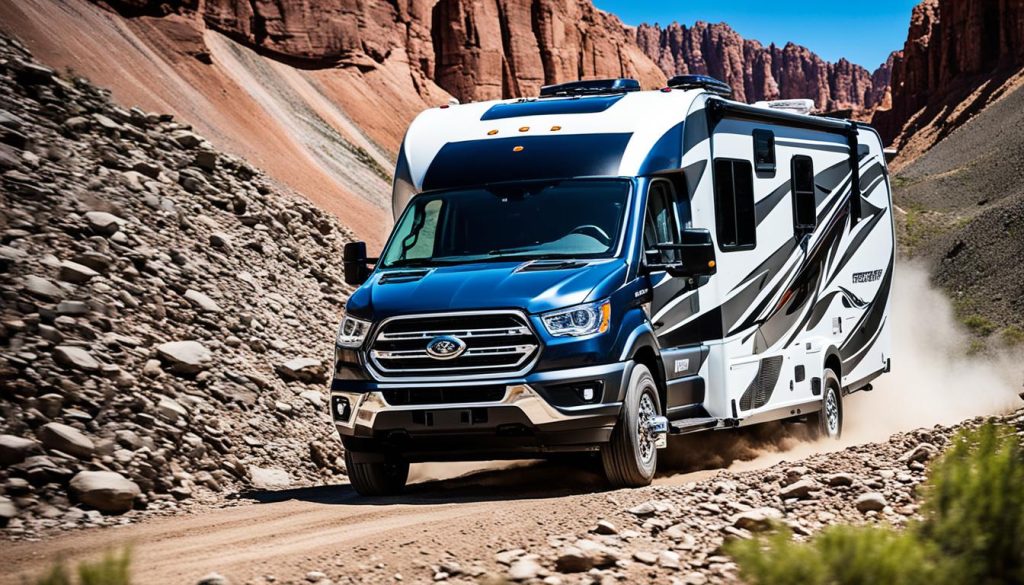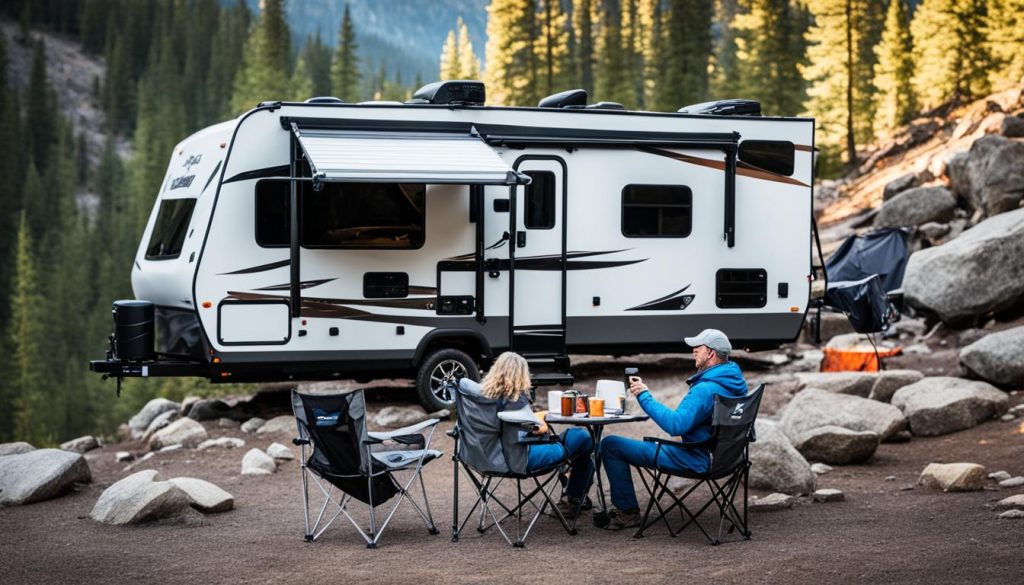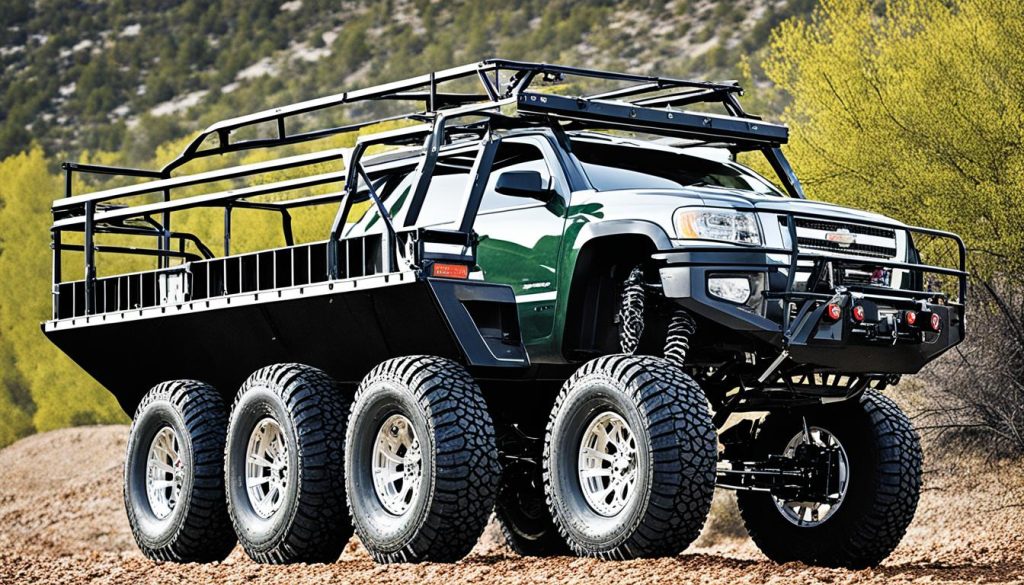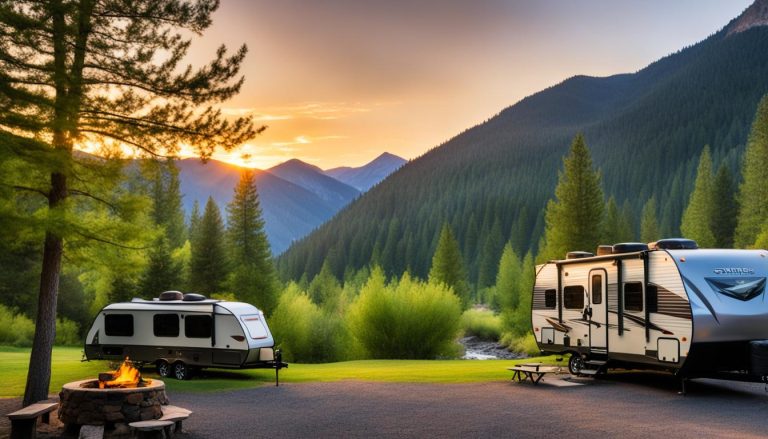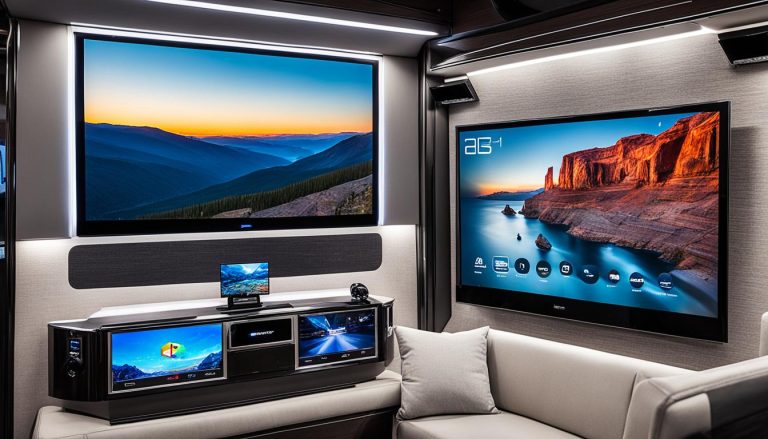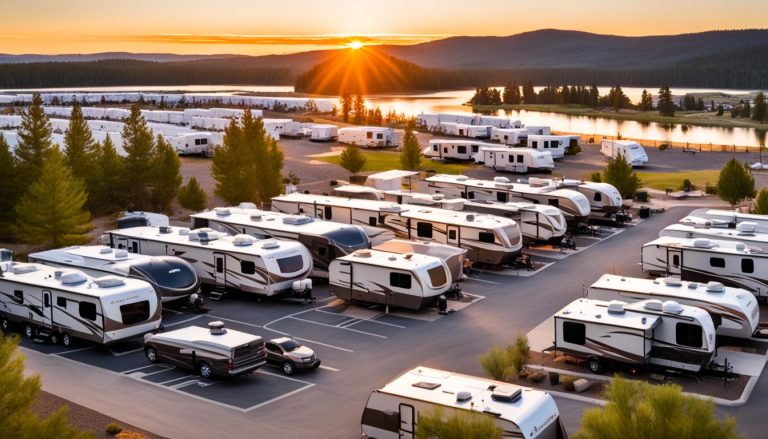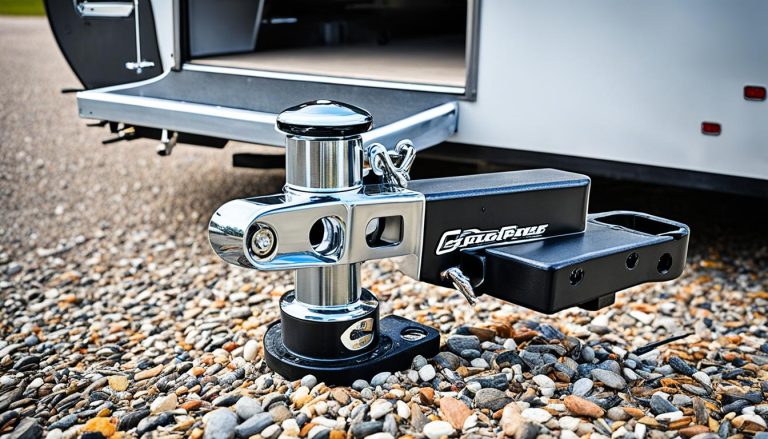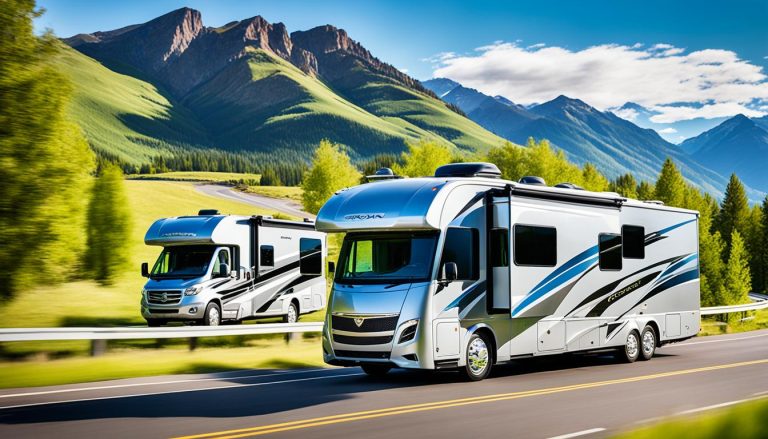Unlock Towable RV Off-Road Capabilities
gorvlifestyle.com and its partners may earn a commission if you purchase a product through one of our links
When the road less traveled beckons, avid adventurers turn to the best off-road capable RVs to venture beyond traditional campgrounds into the heart of nature’s unspoiled terrains. Transforming a towable RV to conquer the rugged outdoors requires meticulous planning and precise enhancements. Off-road RV camping essentials extend a RV’s boundaries, beefing up both structure and functionality for those grueling journeys. The grit of an off-road capable Towable RV lies not only in its reinforced body but also in the spirit of those who steer it through uncharted paths.
From robust suspension systems to strategic frame modifications, the journey of equipping a travel trailer with off-road capabilities for Towable RV brings its own set of thrills and challenges. It’s a fine balance between acquiring the toughness needed for the terrain and preserving the comfort that makes the wild feel like home.
Key Takeaways
- Comprehend the essential modifications to enhance your towable RV’s off-road capabilities.
- Explore how off-road RV camping essentials contribute to a safer and more enjoyable adventure.
- Identify the characteristics that define the best off-road capable RVs in the market.
- Learn the significance of customizing your Towable RV to suit varied and challenging landscapes.
- Understand the importance of reinforcing structural integrity for rugged expeditions.
Exploring the Demand for Off-road Towable RVs
As remote destinations beckon the adventure-thirsty nomads, the quest for the ideal off-road towable RV options intensifies. Modern-day explorers not only desire to venture beyond traditional campsites but also to carry the comforts of home into the untamed wilderness. This intersection of wanderlust and practicality sparks a significant surge in the demand for rugged off-road towing vehicles and off-grid travel trailers that can endure the vigor of the backcountry.
The rising popularity of off-grid travel trailers
The allure of venturing off the beaten path has propelled the off-grid travel trailer to become a coveted asset among outdoor enthusiasts. Built to afford independence from established campgrounds, these trailers cater to those who seek solitude and untouched scenery. They offer the freedom to explore lands less traveled while providing a safe and comfortable haven in the heart of nature.
Adventurers’ shift towards rugged towable RV experiences
Gone are the days when RVing was synonymous with parking lots and manicured hook-up sites. Today’s adventurers are trading these predictable pleasures for the thrill of orchestrating their own off-road escapades. The rugged towable RV has become an emblem of this new era of exploration, representing capability, resilience, and autonomy. With enthusiasts pushing the boundaries of where they can go, the market has responded with innovative designs and tougher builds, although finding a ready-made solution can still be a challenge.
The resulting trend is a grassroots movement towards modifying existing trailers to suit such extreme environments. Whether it’s retrofitting a vintage chassis or customizing a new purchase, the pursuit of the perfect off-road companion is a journey as wild as the destinations themselves.
<!– Since this brief does not require the usage of a table or other tags such as
, ,
,
, or
- , this sample does not contain them. They should be incorporated as per the relevant content requirements. –>
Choosing the Right Towable RV for Off-road Adventures
Off-roading aficionados know that the journey is as significant as the destination. This truth rings especially true when determining which rugged towable RV to hitch to their vehicle. As such, a myriad of factors come into play to ensure that their durable off-road camper provides not just tranquility and shelter amidst the wild but also endures the relentless demands of untamed terrains with grace and reliability. The ultimate pursuit is finding an RV that exhibits exceptional all-terrain RV features, balances durability with agility, and becomes a trusted companion in explorations of the road less traveled.
- Frame and Suspension: The towable RV’s skeleton, its frame must possess the resilience to manage the jarring shocks and vibrations of diverse landscapes, while the suspension system should afford enough flexibility to absorb the bumps without compromising on the vehicle’s integrity.
- Protective Measures: As enthusiasts navigate through gnarled paths and rocky inclines, skid pans and robust shielding for the underbelly safeguard vital components, while flexible plumbing accounts for the variable pressures and angles encountered.
- Ground Clearance: To traverse over obstacles without a scrape, an RV lift can provide the essential height, but attention must be given to not upset the vehicle’s center of gravity, which might otherwise lead to top-heavy dangers.
- Lightweight Structural Bracing: A well-engineered cage can reinforce walls and roofs without burdening the scales, ensuring the RV maintains a nimble posture, ready to glide over rough ground as much as to cozy up in secluded nooks.
It is the sum of these deliberations—the careful equipoise between might and lightness, protection and pliancy—that orchestrates the symphony of a successful all-terrain RV experience. Below, a detailed table illustrates the critical aspects to consider when selecting a resilient partner for your off-road escapades:
Consideration Description Importance Frame Integrity Sturdy construction, resistant to twist and flex under duress. Essential for structural longevity and resilience. Suspension Flexibility Capable of high articulation and dampening to navigate obstacles. Crucial to maintain comfort and protect the RV’s contents. Protective Measures Includes skid plates and systems to guard against abrasion and penetration. Prevents damage to the underside components in rugged terrain. Ground Clearance Height above the ground to avert interference with landscape features. Must have for preventing undercarriage damage. Structural Bracing Reinforcement without significant weight addition. Increases durability while preserving maneuverability. In conclusion, embarking on the quest for the ideal rugged towable RV requires more than a cursory glance at glossy brochures and impressive specifications. It demands an in-depth analysis of the vehicle’s core capabilities and an understanding of how they align with the unpredictable narrative of off-road adventure. With a meticulous approach and discerning eye, uncover an off-road chariot that bestows confidence and endurance on every mile of your wild journey.
Off-road Capabilities for Towable RV: Key Features and Upgrades
For adventurers eager to explore beyond the beaten path, transforming a towable RV into a robust home on wheels essential for challenging terrain is fundamental. Focusing on the core attributes such as off-road RV camping essentials, developing off-road capabilities for a Towable RV, and incorporating all-terrain RV features contribute significantly to the experience.
Importance of Durable Off-road Camper Design
Ensuring a durable design for an off-road camper is a crucial starting point. Reinforcement of the vehicle’s structure to endure varied landscapes is paramount. Enthusiasts often retrofit standard models with resilient materials and innovative designs to help their RVs withstand the rigors of off-road travel.
Customizing Suspension Systems for Rough Terrain
Critical to any off-road RV is a tailored suspension system designed for the unpredictability of rough terrain. Customization often involves modifications like flipped axles and advanced airbag systems, ensuring that the adventure continues smoothly, even when the terrain does not.
Feature Description Benefits Reinforced Wall Structures Integration of sturdier material combinations such as luan, styrofoam, and plywood. Enhanced durability to combat the impacts and vibrations of off-road expeditions. Redesigned Roof Joist System Joists that securely tie into the RV’s walls, offering extra support and stability. Prevents structural integrity loss against the stresses of uneven terrain. Flipped Axles and Increased Suspension Retrofitting axles and incorporating adaptable suspension systems catered to off-road conditions. Increased ground clearance, improving the RV’s ability to traverse rough landscapes. Airbag Suspension Systems Adjustable airbag suspensions allowing for control and customization of ride height and firmness. Gives the driver the flexibility to adapt the rig for comfort and tire protection on varying terrains. Full Frame Rebuild Complete overhaul of the RV’s existing frame for a robust and resilient base. Allows for a level of customization and strength that stock frames often do not provide. The journey to an impeccable off-road RV experience is as thrilling as the destinations they are designed to reach. Equipped with resilience and advanced features, these modified homes on wheels are ready for any adventure the roads—or the lack thereof—might present.
Structural Reinforcements for Enhanced Durability
Transforming a basic travel trailer into a durable off-road camper requires significant structural reinforcements. The purpose of these enhancements is to provide a resilient framework capable of withstanding the challenges of backcountry travel. One of the essential steps in this transformation process is reinforcing the vehicle’s base with sturdy Z-members.
These Z-members have been a mainstay in older RV designs due to their dependable contribution to the structure. However, on their own, they are not entirely adequate for the rigors of off-road travel. Crafting a fortified frame from this starting point often involves the integration of a steel ladder frame. This upgrade not only amplifies the strength but also preserves the camper’s necessary efficiency.
Further implementations often encompass the addition of plywood to the frame, creating a synergy of metals and wood for a comprehensive reinforcement strategy. As a result, a rugged towable RV emerges, capable of conquering various terrains without sacrificing insulation against the elements—a concern of many outdoor enthusiasts who require the comforts and off-road RV camping essentials even when venturing to the most remote locations.
Structural Component Material Used Intended Purpose Advantages Base Frame (Z-members) Steel Base support for various enhancements Improves structural integrity Reinforcement Frame Steel Ladder Frame Supplementary strength for off-road durability High resistance to bending and torsional forces Plywood Attachments Plywood fixed to the frame Additional robust structure and insulation Combines strength with efficiency The confluence of traditional materials and innovative designs thus equips the modern adventurer with a vehicle that is not only enduring but also imbued with the necessities for a comfortable and adventurous off-road experience. As such, the pursuit of structural reinforcements is much more than mere physical alterations; it’s an investment into the essence of the off-road lifestyle.
Optimizing Towable RV Performance on Tough Terrain
For those who venture into remote and rugged landscapes, the performance of their towable RVs is vital. Enhancing an RV’s ability to navigate these rough terrains requires a focus on pivotal modifications and intelligent design choices. Towing vehicles specifically engineered for off-road scenarios are key to conquering the outdoors. Below, we delve into best practices for effective weight distribution and strategies to improve ground clearance and stability, ensuring that your all-terrain experiences are both thrilling and safe.
Best Practices for Managing Towable RV Weight Distribution
Proper weight distribution in towable RVs is crucial for optimum performance. A harmonious balance of weight not only eases the strain on rugged off-road towing vehicles but also significantly improves maneuverability. A well-distributed load is less likely to sway, contributing to a more stable and controlled driving experience on unpredictable paths. This balance is particularly important when towing an RV that features all the comforts needed for off-grid living.
Strategies for Improving Ground Clearance and Stability
Ground clearance is a critical factor for any RV when facing undulating off-road trails. By elevating the suspension system, not only is underbody damage avoided, but it also ensures that the essential components are protected when navigating over rocks, tree roots, and ruts. Augmenting ground clearance naturally enhances off-road capabilities for Towable RVs, fostering confidence as adventurers tackle challenging backcountry roads. Meanwhile, wider tracks and flared wheel wells contribute to a broader base of support, addressing any top-heavier designs and further ensuring the vehicle’s stability.
Weight Distribution Strategy Ground Clearance Improvement Stability Enhancement Equally distributed payload Raised suspension system Wider axle track Heavier items closer to the axle Skid plates for protection Flared wheel wells for wider base Periodic weight checks Larger, more durable tires Strategically lowered center of gravity In conclusion, the application of meticulous weight management methods coupled with the aim for amplified ground clearance and stability plays a defining role in preparing a towable RV for the rugged outdoors. By adopting these strategies, owners of all-terrain RVs can assure a smoother, safer journey as they explore the vast, untamed wilderness that lies beyond the pavement.
Essential Gear for Off-road RV Camping
Embarking on an off-road RV adventure demands specialized gear designed for both resilience and comfort. To fully enjoy the capabilities of a rugged towable RV, seasoned campers curate a collection of off-road RV camping essentials that serve to overcome any challenges presented by wild terrains while providing a sense of home away from home.
Here is a selection of critical items that should be part of any off-road camper’s inventory. These elements ensure safety during vehicle recovery, protect the RV’s undercarriage, and promote energy self-sufficiency, making the remote camping experience both secure and sustainable.
Category Essential Items Additional Notes Vehicle Recovery
- Winches
- Traction Mats
- Tow Straps
Powerful winches and sturdy traction mats aid in navigating through muddy or slippery terrain, while durable tow straps are crucial for vehicle rescue scenarios. Protection
- Underbody Skid Plates
- Rock Sliders
- Bull Bars
Skid plates protect vital underbelly parts from rocks and debris, while sliders and bars shield the body and enhance the off-road capabilities for Towable RV. Self-Sufficiency
- Solar Panels
- Generators
- Water Purification Systems
Solar panels and generators ensure an uninterrupted power supply, and water systems provide potable water, essential for extended stays in the wilderness. Storage Solutions
- Rooftop Cargo Carriers
- Elevated Racks
- Hitch-mounted Storage Boxes
Elevated storage solutions keep essential gear safe from water crossings and maximize space for additional supplies and equipment. Blending the raw power of your rugged towable RV with these crucial off-roading instruments not only enhances the journey but ensures a level of preparedness for whatever the trail presents. Adventure seekers can go far beyond the beaten path, safe in the knowledge that their gear is as ready for the rough as they are.
All-Terrain RV Features Across Different Brands and Models
As adventurers pursue the thrill of off-grid excursions, the market has responded with an impressive array of rugged towable RV options. Various manufacturers have cast their vision of the perfect all-terrain vehicle, resulting in a diverse fleet of RVs equipped with all-terrain RV features that cater to the intrepid traveler. In this competitive landscape, let’s delve into the specifics that set some brands apart and examine real-world modifications that have proven successful.
Comparing rugged off-road towing vehicles and trailers
The ruggedness and reliability of off-road towable RVs vary significantly among different brands and vehicles, with each presenting unique advantages for the discerning nomad. The following table outlines the standout characteristics and capabilities of several leading contenders in the realm of rugged and durable off-road RVs.
Brand Model Notable Features Factory-Built/Modified Airstream Basecamp All-terrain tires, Rear hatch for easy loading Factory-Built Jayco [Older Models from 1980s] Sturdy construction, favorable for modifications Modified KZ RV Escape E17 Hatch Increased ground clearance, solar prep Factory-Built Black Series Headquarters HQ19 Independent suspension, Off-road armor Factory-Built Bruder EXP-6 Cutting-edge suspension, Solar capability Factory-Built Case studies of successfully modified off-road travel trailers
Custom modifications breathe new life into standard travel trailers, transforming them into off-road towable RV options ready to battle rugged terrain. Some noteworthy examples include the modification of 1980s Jayco models, which have proved to be an ideal foundation for upfitting due to their inherent solid build quality. Modifications can range from expanding wheel wells to retrofitting solar power systems, each tailored to the adventurous spirit of their owners. RV enthusiasts often opt for hard-sided designs for their added protection against the elements, making them a preferred choice for year-round adventurers seeking the freedom of boondocking in tougher terrains.
The world of off-road RVing continues to evolve as manufacturers innovate and customizers improvise. As explorers seek out the backroads less traveled, their towable RVs stand ready for the journey–be they factory models or custom rigs born from a labor of love.
Maintaining and Repairing Your Off-road Capable RV
For the adventurer who revels in the thrill of off-road RV camping, ensuring that their rugged home-away-from-home remains in prime condition is paramount. An off-road capable RV endures a greater degree of wear and tear than its standard counterpart, calling for ongoing diligence and a proactive maintenance strategy.
Regular checks and balances for off-road trailer maintenance
When it comes to maintaining a durable off-road camper, routine checks are the first line of defense. These checks should encompass all aspects of the RV, with a sharp eye on certain areas that bear the brunt of off-road conditions. Regular maintenance not only prevents inconvenient breakdowns but also extends the longevity and performance of your trailer.
Below is a maintenance checklist designed to keep your RV in top condition:
Component Inspection Frequency Maintenance Tips Suspension System After each off-road trip Look for signs of damage or wear to shocks and struts. Ensure all bolts are tight and components are lubricated. Tire and Wheels Before and after each trip Check tire pressure, scrutinize tread wear, and inspect wheel bearings. Brakes Every 3,000 miles Clean and adjust as necessary, replace pads or shoes if worn below the minimum thickness. Exterior Frame and Body Seasonally Inspect for rust or damage, apply protective coatings, and repair any breaches to prevent moisture ingress. Underbody After any rough trips Ensure skid plates are intact and there is no significant damage to undercarriage components. Understanding the unique repair needs of off-road RVs
Mastery of your RV’s individual quirks and characteristics becomes crucial when addressing the unique repair needs of an off-road vehicle. Whether it’s sourcing the right parts for your rugged off-road towing vehicles, or knowing how best to optimize your camper’s off-road capabilities, knowledge is power in the world of off-road maintenance.
One should not overlook the critical nature of regular servicing from professionals familiar with the specific challenges posed by off-road travel. Skilled mechanics can provide invaluable advice on upgrades and replacements that will enhance your experience and maintain the integrity of your durable off-road camper.
Enthusiasm and self-reliance are part and parcel of the off-road RV lifestyle, making knowledge of basic repair skills an essential aspect of your arsenal. Being prepared and well-informed translates into confidence on the trails, ensuring that your journeys into the wild are as carefree as they are exhilarating.
Adventurer Insights: Real Stories of Off-road Towable RV Excursions
In this thriving era of mobile exploration, adventurous spirits have passionately shared their tantalizing tales of the unbeaten path with off-grid travel trailers, pushing the boundaries of where wheels and ambition can take them. Swapping pavement for the untamed wild, these hardy travelers have met the wilderness head-on, equipped with the best off-road capable RVs. From navigating unforeseen obstacles to creative problem-solving—like the craft of towing a trailer backwards through trails devoid of space to turn—they embody resilience and an unparalleled zest for exploration. Their recollections illustrate not just the thrill of discovery, but also the critical utility of advanced preparation and adaptability.
Their stories extend beyond the exhilaration of adventure to offer a glimpse into the demanding trials their rigs endured—rigorous frame reinforcements, innovative axle adjustments, and an exhaustive examination of every bolt and bracket. Such real-world experiments in remote landscapes validate the exhaustive research and labor invested into transforming a conventional camper into an off-road towable RV option. Improved trailers are not merely vehicles; they are trusty companions that bear the weight of their wanderlust, providing sanctuary and comfort amidst the rugged tranquility of off-grid destinations.
Fervor for the open land courses through these anecdotal threads, revealing why adventurers cast aside the allure of standard campgrounds for the empyreal beauty of boondocking locations, accessible only to those equipped with enduring and self-reliant travel trailers. These narratives spark the flame of inspiration for those yearning to craft an off-road capable RV; be it a seasoned camper seeking to overhaul their travel trailer or a newcomer dreaming of a home on the go that can endure the undulations of the backcountry. Above all, these personal accounts stand as a tribute to the spirit of adventure and the triumphs of those who dare to roam off the grid.
FAQ
What are the best off-road capable RVs for adventurers?
The best off-road capable RVs often include models with reinforced structures, beefed-up suspension systems, increased ground clearance, and rugged tires. Brands like Kimberley Karavan, as well as retrofitted older models from brands like Jayco, are popular among enthusiasts looking for vehicles that can handle off-grid conditions.What essentials should I pack for an off-road RV camping trip?
For an off-road RV camping trip, pack recovery gear like winches and traction mats, protective underbody gear to shield the RV, solar panels for power, and storage racks for additional supplies. Pack for both the practicalities of off-road travel and comfort in the wilderness.What features should I look for in a towable RV for off-road capabilities?
Look for features like a robust frame structure, high-quality suspension systems capable of handling rough terrain, protective underbody plates, adequate ground clearance, and possibly all-terrain tires. Stability and weight distribution features are also important for safe and efficient travel.How do I customize a travel trailer for off-road conditions?
Customizing a travel trailer for off-road conditions involves reinforcing the frame and structure, upgrading the suspension system for greater clearance and better load handling, and equipping the RV with off-road tires. It might also include modifications to the interior to prevent damage during movement.What are the primary concerns when maintaining an off-road RV?
The primary concerns when maintaining an off-road RV are the suspension system, chassis strength, and ensuring underbody protection is intact. Regular checks for damage, timely repairs, and potentially reinforcing weak areas are crucial to maintain the RV’s integrity on rough terrain.Can I take any towable RV off-road?
Not all towable RVs are suitable for off-roading. Many standard RVs are designed for paved roads and may require significant modifications to handle rough terrain. It’s crucial to check the RV’s design, construction, and features to ensure that it’s capable of off-road travel safely.Are older RV models better for off-road modifications?
Older RV models are sometimes preferred for off-road modifications due to their perceived sturdy construction. They can serve as a good base for strengthening the frame, upgrading suspension, and other necessary changes for off-road use.How important is ground clearance for a towable RV when off-roading?
Ground clearance is extremely important for a towable RV when off-roading. It prevents damage to the undercarriage from rocks, tree stumps, and uneven terrain. Adequate clearance helps in safely traversing through tough landscapes without causing harm to the RV.What are some strategies for improving my RV’s off-road stability?
Strategies for improving an RV’s off-road stability include widening the wheel track, flaring out the wheel wells for a broader base, reducing the center of gravity, and ensuring even weight distribution. Upgrading to a suspension system that can adapt to uneven ground also contributes to stability.How do different brands and models compare in terms of all-terrain RV features?
Different brands and models offer a range of all-terrain RV features. Some are factory-equipped with heavy-duty suspensions and reinforced frames for off-road use, while others are more basic and may need significant alterations. It’s vital to compare models based on specific off-road features and capabilities before making a purchase.Why is regular maintenance more important for off-road RVs?
Regular maintenance is crucial for off-road RVs due to the additional stress and wear they experience on rough terrain. This ensures that all the systems and features specifically designed to handle the rigors of off-road travel remain in optimal condition and prolongs the lifespan of the RV.Can off-road modifications to an RV affect its on-road performance?
Yes, off-road modifications might affect an RV’s on-road performance, often in the form of changes to fuel efficiency, handling, and overall comfort during highway driving. It’s important to find a balance between off-road capability and on-road performance that suits your travel needs.

